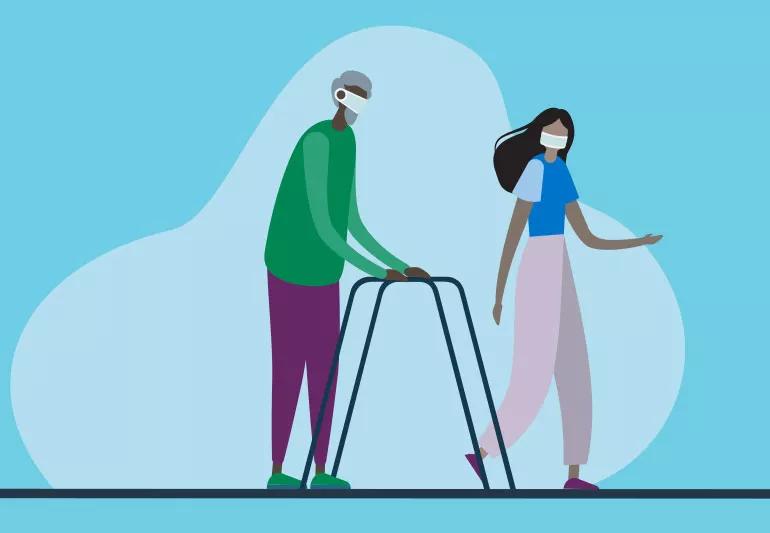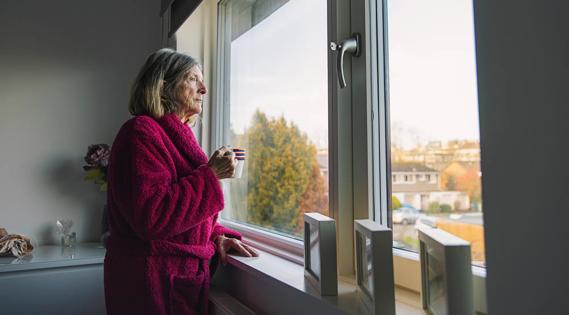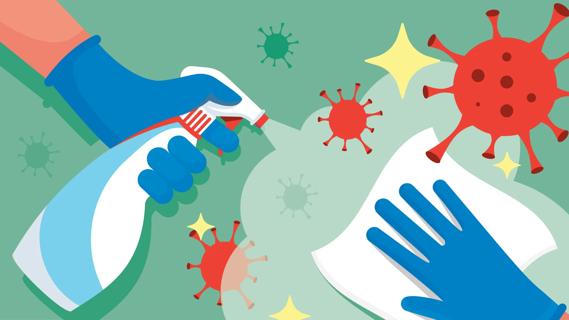Advertisement
Keep your grandparents and others safe

One of the constant refrains we’ve heard throughout the pandemic has been that older adults have an increased risk of infection and serious illness if they contract the virus. And that’s meant a lot of separation between kids and grandparents.
Advertisement
Cleveland Clinic is a non-profit academic medical center. Advertising on our site helps support our mission. We do not endorse non-Cleveland Clinic products or services. Policy
For over a year, you may have been tempted to throw caution to the wind and pay your older family members a visit. After all, with vaccines becoming more widely available, shouldn’t it be safe by now?
Geriatric medicine specialist Ardeshir Hashmi, MD, says that such a visit is possible, but only with careful planning and precautions. Here’s what to consider to make such a gathering possible – and safe.
First and foremost, Dr. Hashmi says you have to be on top of your own health first, which includes making sure you’re not showing any coronavirus symptoms. If you do, well, you better put that trip on hold. “It’s important to have ourselves checked and also be very judicious about waiting so that the symptoms are not with us for a good period of time,” he says.
The precautions don’t stop with you. Even if you’ve been symptom-free for 14 days and you’re ready to go visit your older relatives, you should also keep their health top of mind, too.
That’s because of the elevated risk of contracting the virus in older age groups, not to mention the higher mortality rate. These older members of your family are also more likely to have a condition that has a high co-morbidity with the virus, like cancer or heart disease or take medication that suppresses their immune systems.
Advertisement
If your family members have these conditions, and especially if there are multiple issues at play, Dr. Hashmi suggests reconsidering the visit.
But what if your older relatives are fully vaccinated?
That will still depend on your family’s circumstances and comfort levels. A person is considered fully vaccinated two weeks after their second dose of the Moderna or Pfizer vaccine and two weeks after the single dose of the Johnson and Johnson vaccine. It’s important that you abide by these timeframes so that your older family member’s immune system has time to process the vaccine so they are protected.
If your older family member is fully vaccinated, the CDC has said it’s safe for one household to now gather with them, indoors. This means that grandparents who are fully vaccinated can now visit maskless, indoors with their low-risk, unvaccinated children or grandchildren who all live under the same roof.
If everyone’s health is at a level that makes a visit safe, you’ll need to be on top of all the necessary social distancing and vaccination guidelines. These can vary by city and state, so if long-distance travel is involved, you’ll need to account for additional travel logistics such as mode of transportation (car versus an airplane, for instance) and any lodging accommodations you’ll need.
If you’re visiting older family members in a nursing home or retirement community, those locales will likely have their own set of guidelines, too.
Ideally, your visit can take place outdoors to help increase physical distance and to decrease the likelihood of letting any possibly virus-laden air droplets hang around. If you have to meet inside, try to open a window or two to help increase the circulation of fresh air.
And, again, don’t forget about the six-foot distance and masks to help ensure as safe an environment as possible.
“It’s still a visit, but a different visit where the solid core guidelines of vaccination, frequent hand washing, social distancing and wearing masks are absolutely key,” said Dr. Hashmi.
Advertisement
Learn more about our editorial process.
Advertisement

Studies have shown promising results, but additional research is needed

Infection and inflammation can cause you to lose your voice and have other voice changes until you’re fully healed

A COVID-19 infection can bring on depression or anxiety months after physical symptoms go away

Just like the flu, COVID-19 continues to evolve every year with new and smarter variants

The latest omicron subvariants carry specific mutations that may allow the SARS-CoV-2 virus to be better at evading immune protection

You can work out with mild COVID-19, but not in a gym, and listen to your body and don’t overdo it

Most people can return to work and regular life when they’re symptom-free for 24 hours

Lysol Disinfecting Wipes are just one of more than 500 products approved by the EPA for protection against the SARS-CoV-2 virus that causes COVID-19

If you’re feeling short of breath, sleep can be tough — propping yourself up or sleeping on your side may help

If you fear the unknown or find yourself needing reassurance often, you may identify with this attachment style

If you’re looking to boost your gut health, it’s better to get fiber from whole foods